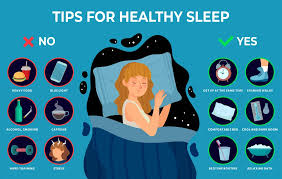Getting quality sleep is essential for our health and well-being, yet many people struggle to get the rest they need. Sleep affects nearly every aspect of our lives—from mental clarity and mood to immune function and overall productivity. But what does science say about improving sleep?
This blog explores the science behind good sleep and offers practical, evidence-based tips to help you enjoy a restful night.
The Importance of Sleep
Sleep isn’t just a time for your body to rest—it’s a critical process for physical and mental restoration. During sleep, your body:
• Repairs muscles and tissues.
• Strengthens your immune system.
• Consolidates memories and enhances learning.
• Regulates hormones like cortisol (stress) and melatonin (sleep).
Chronic sleep deprivation has been linked to serious health issues, including heart disease, diabetes, and depression. That’s why understanding how to improve your sleep is crucial.
The Science Behind Sleep
Sleep operates in cycles, each lasting about 90 minutes, and includes four stages:
1. Light Sleep (Stages 1 & 2): Your body begins to relax, and brain activity slows.
2. Deep Sleep (Stage 3): This is when physical restoration occurs.
3. REM Sleep (Stage 4): Dreams occur here, and your brain processes emotions and memories.
The key to feeling refreshed is not just the quantity of sleep but also the quality—achieving the right balance of these stages.
Tips for a Restful Night
Here’s how science can help you improve your sleep quality:
1. Stick to a Sleep Schedule
• Go to bed and wake up at the same time every day, even on weekends.
• Consistency reinforces your body’s internal clock (circadian rhythm), helping you fall asleep and wake up naturally.
2. Create a Relaxing Bedtime Routine
• Engage in calming activities like reading, meditating, or taking a warm bath before bed.
• Avoid stimulating activities, such as intense exercise or stressful conversations, close to bedtime.
3. Limit Exposure to Blue Light
• Blue light from screens suppresses melatonin production, delaying sleep onset.
• Reduce screen time at least 1-2 hours before bed, or use blue-light-blocking glasses if needed.
4. Optimize Your Sleep Environment
• Keep It Cool: The ideal bedroom temperature is around 65°F (18°C).
• Dark and Quiet: Use blackout curtains and a white noise machine if necessary.
• Comfortable Bedding: Invest in a quality mattress and pillows that suit your sleeping style.
5. Watch What You Eat and Drink
• Avoid heavy meals, caffeine, and alcohol close to bedtime.
• If you’re hungry, opt for a light snack with sleep-promoting nutrients like bananas, almonds, or warm milk.
6. Exercise Regularly
• Physical activity improves sleep quality, but try to finish workouts at least three hours before bedtime to avoid overstimulation.
7. Manage Stress
• Stress and anxiety are common culprits of poor sleep. Practice stress-reduction techniques such as mindfulness, deep breathing, or journaling to calm your mind.
8. Limit Naps
• Short naps (20-30 minutes) can boost energy, but long or late-afternoon naps may interfere with nighttime sleep.
9. Expose Yourself to Natural Light
• Sunlight helps regulate your circadian rhythm. Spend time outdoors during the day or open your curtains to let in natural light.
10. Seek Professional Help if Needed
• If you’re consistently struggling with sleep despite making changes, consult a healthcare provider. Conditions like insomnia or sleep apnea may require specialized treatment.
The Role of Sleep Hygiene
Sleep hygiene refers to habits and practices that promote good sleep. Incorporating these tips into your daily routine can help signal your body that it’s time to wind down, making it easier to fall and stay asleep.
Better sleep isn’t just about luck—it’s about understanding the science of rest and making deliberate changes to your lifestyle. By following these tips, you can improve the quality and quantity of your sleep, waking up refreshed and ready to take on the day.
Remember, good sleep is a foundation for good health. Start prioritizing it today, and you’ll soon notice the positive impact it has on your body and mind.



